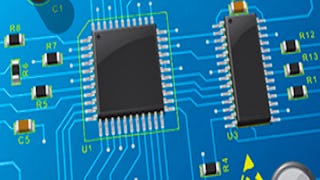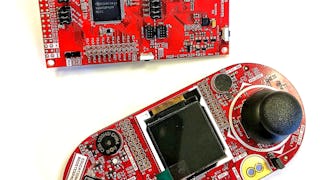This comprehensive course bridges the gap between software and hardware by exploring the fundamental architecture of computing systems through the lens of MIPS (Microprocessor without Interlocked Pipeline Stages). You'll master both theoretical concepts and practical skills essential for understanding how processors execute instructions and how architectural decisions impact performance.

5 days left: Discover new skills with 30% off courses from industry experts. Save now.


MIPS Computer Architecture and Performance Optimization

Dozent: BITS Pilani Instructors Group
Bei  enthalten
enthalten
Empfohlene Erfahrung
Was Sie lernen werden
Evaluate and enhance computer system performance using industry-standard metrics.
Develop proficiency in MIPS ISA, including ALU and register file design for optimal performance.
Design efficient single-cycle, multi-cycle, and pipelined processors to maximize computing power.
Implement and optimize cache memory, understanding its impact on overall system performance.
Kompetenzen, die Sie erwerben
- Kategorie: Hardware Design
- Kategorie: Cloud Platforms
- Kategorie: Hardware Architecture
- Kategorie: System Programming
- Kategorie: Computer Architecture
- Kategorie: File Systems
- Kategorie: Computer Systems
Wichtige Details

Zu Ihrem LinkedIn-Profil hinzufügen
September 2025
93 Aufgaben
Erfahren Sie, wie Mitarbeiter führender Unternehmen gefragte Kompetenzen erwerben.

In diesem Kurs gibt es 10 Module
Learn key performance metrics, Amdahl's law, and benchmarking techniques to evaluate computing systems.
Das ist alles enthalten
9 Videos3 Lektüren7 Aufgaben1 Plug-in
Master the MIPS architecture's instruction formats, addressing modes, and register file structure.
Das ist alles enthalten
11 Videos4 Lektüren12 Aufgaben1 Diskussionsthema
Design arithmetic logic units (ALU) and register files that form the core of MIPS processors.
Das ist alles enthalten
5 Videos2 Lektüren6 Aufgaben1 Diskussionsthema
Create a complete datapath and control unit for executing MIPS instructions in a single cycle.
Das ist alles enthalten
8 Videos3 Lektüren9 Aufgaben1 Diskussionsthema
Break instructions into multiple steps to optimize hardware utilization through multi-cycle execution.
Das ist alles enthalten
10 Videos3 Lektüren11 Aufgaben1 Diskussionsthema
Implement instruction pipelining to significantly enhance processor throughput and performance.
Das ist alles enthalten
10 Videos3 Lektüren11 Aufgaben1 Diskussionsthema
Master techniques to resolve pipeline hazards through forwarding, stalling, and branch prediction.
Das ist alles enthalten
12 Videos3 Lektüren12 Aufgaben1 Diskussionsthema
Explore how different memory types and organization impact system performance.
Das ist alles enthalten
9 Videos3 Lektüren10 Aufgaben1 Diskussionsthema
Analyze and enhance cache memory performance through optimized designs.
Das ist alles enthalten
7 Videos2 Lektüren8 Aufgaben1 Diskussionsthema
Understand hard disk and SSD storage organization to improve data access performance.
Das ist alles enthalten
6 Videos3 Lektüren7 Aufgaben1 Plug-in
Dozent

Mehr von Software Development entdecken
 Status: Kostenlos
Status: KostenlosPrinceton University

University of Colorado Boulder
 Status: Vorschau
Status: Vorschau Status: Kostenloser Testzeitraum
Status: Kostenloser TestzeitraumMicrosoft
Warum entscheiden sich Menschen für Coursera für ihre Karriere?





Neue Karrieremöglichkeiten mit Coursera Plus
Unbegrenzter Zugang zu 10,000+ Weltklasse-Kursen, praktischen Projekten und berufsqualifizierenden Zertifikatsprogrammen - alles in Ihrem Abonnement enthalten
Bringen Sie Ihre Karriere mit einem Online-Abschluss voran.
Erwerben Sie einen Abschluss von erstklassigen Universitäten – 100 % online
Schließen Sie sich mehr als 3.400 Unternehmen in aller Welt an, die sich für Coursera for Business entschieden haben.
Schulen Sie Ihre Mitarbeiter*innen, um sich in der digitalen Wirtschaft zu behaupten.
Häufig gestellte Fragen
This course explores MIPS architecture and computing system performance optimization. It's important because understanding how hardware executes software instructions is essential for writing efficient code, designing faster systems, and solving performance bottlenecks in computing applications.
This course is for computer science students, software developers, hardware engineers, and technology professionals who want to understand the crucial interface between software and hardware to enhance their technical capabilities.
You'll be able to analyze processor architectures, design efficient datapaths, optimize memory hierarchies, resolve pipeline hazards, measure system performance, and understand the hardware implications of software design decisions.
Weitere Fragen
Finanzielle Unterstützung verfügbar,

